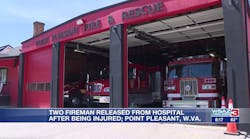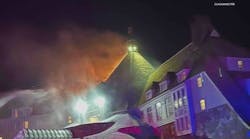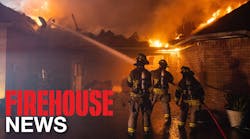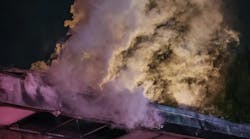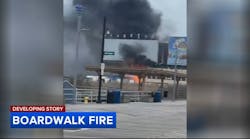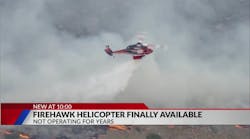Editor's note: This month's Chief Concerns column is a departure from our usual format, in that it takes the form of an interview with one nationally prominent fire chief conducted by another. Dennis L. Rubin, who has been chief of the District of Columbia Fire & EMS Department for just over a year, discusses his career experiences, his responsibilities as fire chief in the nation's capital and his ideas for the future. The interview was conducted by his fellow Firehouse® Contributing Editor Charles Werner, chief of the Charlottesville, VA, Fire Department.
Dennis L. Rubin's experience in the fire-rescue service spans more than 35 years. On April 16, 2007, Rubin was appointed chief of the District of Columbia Fire and Emergency Medical Services Department -- the same department he joined as a line firefighter at the age of 21. As chief, Rubin commands a staff of over 2,000 sworn and civilian employees and manages an annual operating budget in excess of $170 million. The department he leads is responsible for protecting more than a million people who visit, work and live in the nation's capital each day as well as safeguarding national landmarks from the U.S. Capitol to the White House. Prior to his appointment, Rubin was chief of the Atlanta, GA, Fire and Rescue Department. He also has served as chief of the Norfolk, VA, Fire Department and was fire chief and city manager in Dothan, AL. In 1994, Rubin was president of the State Fire Chiefs Association of Virginia and he was the host fire chief for the 1999 Southeastern Fire Chiefs Association Conference in Dothan. He serves on several committees with the International Association of Fire Chiefs (IAFC), including a two-year term as the Health and Safety Committee chair. He also was the host fire chief for the "Wingspread IV" and "Wingspread V" conferences in 1996 and 2006.
Rubin holds a bachelor of science degree in fire administration from the University of Maryland and an associate in applied science degree in fire science management from Northern Virginia Community College. He is enrolled in the Fire and Emergency Management Administration program at the graduate school of Oklahoma State University. He is a 1993 graduate of the National Fire Academy's Executive Fire Officer (EFO) program and a Certified Emergency Manager (CEM), and he has obtained the Chief Fire Officer (CFO) designation from the IAFC. He has been an adjunct faculty member of the National Fire Academy since 1983 and authored the book Rube's Rules for Survival. Rubin is a long-standing Firehouse® contributing editor and has written more than 140 technical articles related to fire department operations, administration, training and safety.
WERNER: You have had a diverse fire service career. Please provide an overview of your journey.
RUBIN: What a wonderful journey I have had so far. I was appointed to the Fairfax County Fire Department in October of 1971. I completed recruit school and was assigned to Bailey's Crossroads -- Station 10 on Route 7, long since relocated. My next stop was my dream job and that was the District of Columbia Fire Department. I was soon assigned to Engine 10 in the Trinidad section of the city. Wow, what a great place to learn and be a part of a metropolitan fire department. This is the point in my career that I became "mobile" and after a few short stops, I headed west. I found myself as a captain in the Mesa (Arizona) Fire Department. I learned way too much about firefighter line-of-duty deaths in Mesa. For the next 10 years, I was with the Chesterfield Fire Department in central Virginia as a battalion fire chief. Eight years were spent as the chief of training and safety and two years as the southern battalion chief on the A Shift. Chesterfield prepared me to take on the mantel of the fire chief's position in southeast Alabama. In 1996, I raised my hand and was sworn in for the first time as the fire chief of a community. What a wonderful time and opportunity in my career and in my personal development to land my first chief's job. The five years that I spent in Dothan, Alabama, was some of the best years. Dothan is a community of about 65,000 folks and the fire-rescue department was a core service function. I would later be asked to return as the city manager and that was a wonderful learning experience as well for me.
As the capital of the "New South," I had to throw my hat in the ring for the Atlanta chief's job. I was very pleased to be selected and get a chance to be a "Metro Fire Chief." The pace was fast and furious, but always rewarding. The mayor was systematically reorganizing all city departments and now it was the fire-rescue department's turn. Once again, "wow" is the only word that comes to mind to describe the experience. There was some stress, but all in all what a great city government agency and wonderful fire department.
The last and current stop started in December 2006. I received a phone call from the new Mayor-Elect Transition Team Office. After months of interviews, background checks and hearings, I found myself back home in Washington, DC. My current personal theme song is that of Bon Jovi "Who Says You Can't Go Home?" It is great to be reunited with the department that I love and that is in my hometown. It is a huge honor to pin on the badge as the 25th chief of department of this great department.
WERNER: What was the single most important factor that influenced you to pursue becoming a fire chief?
RUBIN: The internal personal drive to become a fire chief happened at about the 10-year mark in my career. I felt a strong need, and still do, to have impact in the safety of our community and safety of our members. As a person goes through the ranks, it is easy to see the overall influence that you have over your company, battalion or your division. So, there seemed to be a direct correlation between input and impact coupled with a members rank. That is the primary reason (firefighter safety) that I worked diligently to obtain the job title of chief of department.
WERNER: How would you describe your style of management and who are some of the leaders (fire service or otherwise) that influenced your style of management?
RUBIN: I would describe myself as a person that looks to empower the folks that are around me to make the organization better. There is way too much work for any one person to handle, so trying to lead by example and support the growth and decisions of others is important. I always reserve the right to the final decision and take full responsibility for all that happens under my watch. But folks seem to want the freedom and the latitude to do their work and be creative.
As I have set the bar of expectations, the members have always delivered a product a little better and higher quality than I ever expected. Define the task; provide the resources; get out of the way and evaluate the results -- standard leadership process for me. I hope that I can be identified as a person that has facilitated that process.
Without a doubt, along with dozens or hundreds of firefighters, Fire Chief Alan V. Brunacini has been my role model, hero, sounding board, benchmark, close advisor, mentor and most importantly my friend. There are dozens of others, like Bruce Varner, but no one can hold a candle to Chief Brunacini.
WERNER: As you moved between fire chief positions, what were the significant differences?
RUBIN: No real differences of significance that I can tell! The iced tea in Alabama is always sweet, but not in DC. On a serious note, the basics of the organizations are amazingly similar. Perhaps the most glaring variation comes from the government structure. The internal workings of a "strong mayor-city council" form of government (Atlanta and DC) is quite different from that of a "city council-city manager" (Dothan and Norfolk) structure. You start learning those differences on the first day at work and they are not very subtle at all. However, how we operate, our core values of community service and firefighter safety, the needs and concerns of the members (labor unions) are about the same everywhere. I have found that citywide policies are more similar than different, so I would say most departments are more alike than different.
WERNER: To date, what has been the job that you have enjoyed the most and why?
RUBIN: The assignment that I have enjoyed the most is the current one, DC Fire & EMS Department. For many years, I have been preparing to be a part of this department and with a lot of good luck and fortune, I have found myself back home. We have a lot of challenges, but without a single doubt, we are the best in the nation at what we do and we will showcase the great people that make up this organization. When I was a very young child, the DCFD was recognized as one of this country's best fire and EMS agencies. The current administration, both city and department, are committed to returning to the previous state. What an exciting time to be a member of this department.
WERNER: What did you learn while serving as a city manager and how did it help shape your fire service career?
RUBIN: The city manager's position was another example of a great opportunity. I don't speak about it much, but I learned a lot more about the broader operation of government from storm-water drainage to retirement systems to traffic control. This collection of experiences allowed me to take a different look/approach at what government does and should do at the local level. Oddly enough, I ran the city government just like I ran the fire-rescue department and all seemed to work just fine. As I mentioned earlier, vivid experiences somehow find their way into topics for my Firehouse® articles. There are seven topics in a series entitled "Messages from the Dark Side." That's right from my life as a city manager exposed for all to see on the pages of my beloved magazine. By the way, the mayor and city council didn't get the "dark side" reference.
WERNER: What was it like returning to DC and what is the comparison from when you first started, then upon returning as chief?
RUBIN: When I was growing up, all I wanted to do was to work for DCFD. Fairfax County was great, but DCFD would not hire anyone during the Vietnam War years, so it was off to the county until the district called. Soon after the national military draft lottery was held, DC was hiring qualified folks with high lottery numbers and mine was 321 (Sept. 3). So, it was off to DCFD and the rest is history. Returning to the department that I left in 1979 has been a super experience!
In many ways, operationally, DCFD is still the best, so I think. After a month or so back in DC, I was working late one night. A "box alarm" (an old holdover from our street fire alarm box system) was sounded for a very familiar address in the Trinidad section of town. As I drove toward the well-involved rowhouse, the operation made an old fire chief smile! We had two supply lines to the front of the building along with three attack lines and three ladders up to the front of the address. Just about the same complement was supporting the operation in the rear alley -- 54 of America's bravest firefighters were making quick work of this once-threatening dwelling fire.
By the time I arrived, about six minutes into the operation, the reports were being transmitted to the incident commander, "primary search is negative." Just another day at work and everyone knew their role and performed very well. I am glad to be home once again. Last note, our executive staff and general staff are the best I have ever worked with and they make it a pleasure to report to duty every day.
WERNER: As DC's fire chief, what are the biggest challenges ahead of the DCFD?
RUBIN: The most looming challenge that we have before us is the improvement of our emergency medical service system. The first day at work had me meeting with a prominent district family to express the agency's sorrow over the loss of their loved one and to take responsibility for our actions or lack of actions at an emergency medical call that we did not perform properly. The next day, day number two at work, I was appointed to lead the Mayor's EMS Task Force that was comprised of many of America's most renowned EMS leaders. Also, there were several attorneys, family members of the deceased gentleman and other city agencies attending the EMS Task Force meetings. After six months of effort, we developed a leading-edge EMS system report that has six major recommendations that represent about 50 or so mandated changes. Please refer to our website for detailed information about this process and our status (www.dc.gov). This is an exciting time and opportunity for emergency medical services in the District of Columbia; we are committed to sweeping changes.
WERNER: Can you talk about the DC fire hydrant issue and the status?
RUBIN: The department responded to a rather large building fire at the Georgetown Public Library on April 30, 2007 -- my departmental seniority at this time was one paycheck. When Engine 5 arrived on location, there was heavy fire showing through the roof with roof collapse in progress. The companies worked diligently to quickly extinguish this tremendous blaze; however, we were faced with some adverse situations during the fire fight. The two closest fire hydrants were not operational and of course the media had that bit of information before I had it. Next, I learned that we had not flush-tested hydrants in 10 years or so and the "neglect bill" came due.
After this event was over, we started a comprehensive fire hydrant flush-testing program. As the summer was winding up, the department had flush-tested 10,200 fire hydrants and worked with the Water Authority to repair the out-of-service devices that were noted. Next, we have entered into a memorandum of understanding (MOU) with the Water Authority to flush-test the hydrants twice a year (spring and fall) with the authority providing the flow-testing of the system every two years. Soon, hydrants will be marked based on their flow capability and flush-tested twice per year.
It is the department's sincerest hope that the fire hydrant system becomes a well-maintained system in the very near future. Finally, we will be attempting to regain our ISO Class 1 city rating, so the ever-stressful fire hydrant journey did serve a great purpose.
WERNER: Since DC is considered a target-rich environment for terrorists, what does that mean to you and the DCFD?
RUBIN: I think that the Firehouse® readers would be amazed by the amount of planning, preparation and response that this department puts into this issue. We handled nearly 500 events directly related protecting the homeland to include events at large federal buildings, demonstrations and marches as well as a regular response to protect the President of the United States while he takes off and lands by helicopter anywhere in the district. In several departments that I have worked for, the arrival of the President was a major event that took a lot of planning and preparation. It is the same for DC, except he lives here, meaning that we do that same process several times per day, most any day. Sorry to be vague with this response, but everyone in our profession will fully understand why that is a must. Lastly, we have a very prominent place working within the fusion center to keep the department updated on the best intelligence possible.
WERNER: While I was in DC, several DC firefighters explained to me that they were excited about the positive press for the DCFD. How have you been able to address that and what are the positives that DCFD is engaged in today?
RUBIN: The District of Columbia Fire & EMS Department is an outstanding operation with a few places to improve how we operate. Everyone is working hard to make this agency the best that it can be, so the positive stories are many, based on the great work that we are doing in the streets of this city. I have been honored to report on several occasions that members of this department have saved human life during mass-casualty events, such as the "Unifest" MCI, where 31 folks became instant victims as a drug-crazed motor vehicle operator decided to drive though the crowd. Further, we have had about a half-dozen rescues of citizens from various building fires.
There is one rescue that sticks out in my memory where companies responded to a working fire on the second floor of an apartment with two young boys trapped and left alone asleep. The fire was a block away from Engine 32's quarters in Southeast, so the response time was excellent and the company made a great grab of the two children.
Those are all easy events to have the local media cover and produce a favorable story. Great departments always seem to get good news coverage. We will continue to work to get the story out about the wonderful work of DC F & EMS and it makes the negative stories less painful when they do inevitably happen.
WERNER: After your appointment as DC fire chief, was the job what you expected?
RUBIN: The fire chief's job in the district is all that I thought that it would be in every way. The executive staff members are the best collection of folks that I have had the pleasure to work with in the past 36 years. I can say that it has been a very pleasant surprise with the talents and strengths that are in our department. In late fall, we are off to develop a five-year strategic plan for the department. All levels and interests within the agency will be represented. Chief Alan Brunacini -- no surprise there -- along with Chief Charlie Dickinson of the U.S. Fire Administration and Dr. Burton Clark of the National Fire Academy will be guiding us through the planning process, helping to determine what the next five years will hold for the department. I am truly looking forward to this process.
WERNER: Given your impressive fire service career, if you had a single piece of advice for others who wish to follow in your footsteps, what would you recommend?
RUBIN: That is simple; "keep your eyes on the prize"! If you can, become a "monomaniac" -- focused like a laser on a mission to accomplish whatever you truly want to accomplish in your career. I am sure that the same advice will work in your personal life as well. It took me 36 years and several jobs to be aligned to help lead this department. If I can reach this point, so can you. Focus!
WERNER: What would you say is your most rewarding fire service experience to date?
RUBIN: Every time we host a recruit graduation, it reminds me that we are always renewing and rejuvenating our department, the best is yet to come! These ceremonies help me to focus on what is truly important to the department; the people and their families. Recently, I had a wonderful treat to share the podium with a recruit school classmate (Class 255 in 1973), Lieutenant Richard Belcher (retired). The situation was that Rick's son was graduating from our academy. What a real treat to be with our past, our present and the future of our department.
CHARLES WERNER, a Firehouse® contributing editor, is a 32-year veteran of the fire service and is fire chief of the Charlottesville, VA, Fire Department. He serves on the Virginia Statewide Interoperability Executive Committee, the SAFECOM Executive Committee and the National Public Safety Telecommunications Council Governing Board.
